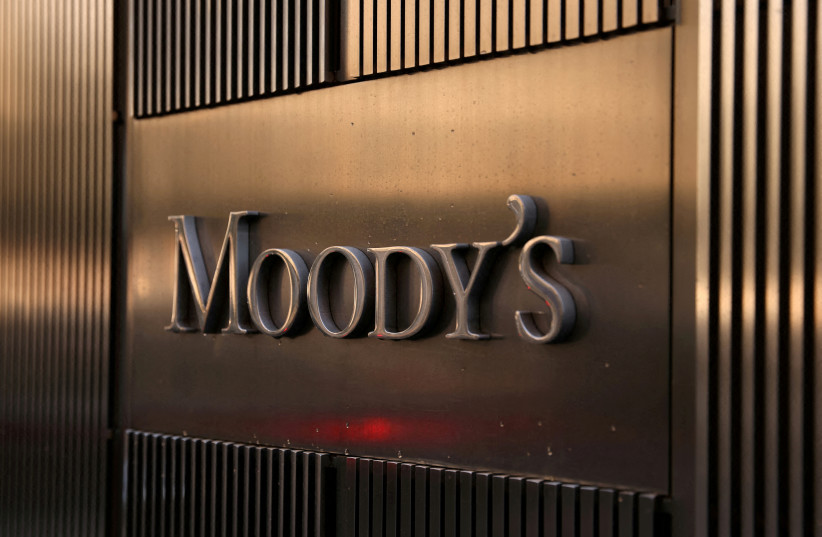A muted response by financial markets to a credit rating downgrade of Israel by Moody's last week shows investors understand that Israel's economy is only temporarily struggling due to the war with Hamas, Prime Minister Benjamin Netanyahu's chief economic adviser said.
Since Moody's on Friday cut Israel's sovereign credit rating to A2 from A1 -- Israel's first ever downgrade for which the agency largely cited the military conflict raising the country's political risk -- markets have moved little.
The shekel ILS = currency now stands at 3.66 per dollar versus 3.68 before the ratings action, in which Moody's kept its outlook at negative to imply a further cut. The main Tel Aviv 125 index is up 1% this week, while government bond prices are largely flat.
"The fact that the markets did not react to Moody's announcement - maybe it's a lack of confidence. It shows the markets do not pay much attention to what Moody's says," Avi Simhon, director of the National Economic Council in the Prime Minister's Office, said in an interview with Reuters.
Israeli officials have reacted angrily to the Moody's downgrade, which Finance Minister Bezalel Smotrich dismissed as a "manifesto" that was not based on sound economic reasoning.

Simhon, like other government officials, believes the ratings reduction was not warranted since the deterioration of public finances is due to the war with Palestinian Islamist group Hamas in Gaza and they believe the economy will recover quickly once the war is over.
As a result of the war that the central bank estimates will cost Israel some 255 billion shekels ($70 billion) through 2025, the budget deficit is expected to jump to 6.6% of gross domestic product in 2024, with the debt to GDP ratio projected to reach 67% this year.
Such levels, Simhon said, are far lower than in many top European countries and are below those in the pandemic when the rating was not lowered.
"The deteriorating public finances are not something fundamental. It's a temporary thing," Simhon said. "We have a war and we have to finance it. It costs a lot but we can manage it without even probably going above 70% (debt to GDP ratio)."
He noted that the debt burden should start to decline in 2025 or 2026 and move back to around 60%, where it was in 2022, a few years later given rapid economic growth.
Economic growth in 2023 is estimated at around 2% with projections for 2024 between 0.5% and 2% - helped by high state spending - before expanding more rapidly in 2025.
The slowdown in 2023 that came amid a global downturn followed robust post-pandemic economic growth of 9.3% in 2021 and 6.5% in 2022. The expansion was led by the high-tech sector that accounts for 17% of economic output, 12% of jobs and 56% of exports.
Israel's government owns most of the country's land and sales of land typically go towards paying down debt, he added.
Simhon said that as long as the war stays contained to Gaza and did not expand to Hezbollah in Lebanon the budget deficit in 2024 will be lower than 6.6%. "With a major war in the north, it could be higher but it's not going to be like the times of corona (when it was close to 12%)," he said.
An approval to a 2024 budget
Israeli lawmakers are soon expected to approve an amended 2024 budget that would require a sharp increase in spending because of the war. The bill is controversial since it includes several billion shekels in funds promised to Netanyahu's political allies when the current coalition was formed in 2022.
Simhon said the amount to allies is small and "symbolic" and won't have an economic impact.
To boost state coffers by 7 billion shekels of revenue, the government plans to raise value added taxes (VAT) to 18% from 17% in 2025.
"I don't think we will need it," Simhon said. "If the deficit will be lower than expected, we will not raise VAT."
Israel's $500 billion economy had been humming along and was expected to grow around 3.5% last year, but after gunmen from Palestinian terrorist group Hamas attacked on October 7, the economy came to a standstill. Israelis stopped spending and travelling, hundreds of thousands were called up into reserve military duty in one of the largest troop mobilizations Israel has ever seen and thousands of Palestinian workers were laid off.
Preliminary data on economic activity in the fourth quarter are due on Monday at 1 pm (1100 GMT) and economists expect a double digit contraction due to declines in consumer spending, investment in areas such as construction - where half of building sites are idle since the government has not yet allowed the return of Palestinian workers - and in service exports.
Consumer confidence stands at levels not seen since the COVID-19 pandemic in 2020, while the annual inflation rate has eased back down to 3%, prompting a Bank of Israel rate reduction of a quarter-point in January.
At the outset of the war, most private spending was just on essential goods like food, while Israelis were not in any mood to travel for leisure, or go to movies or shows.
